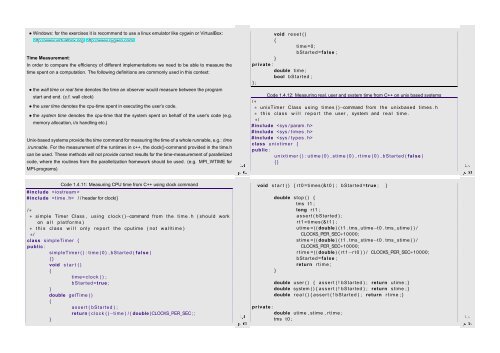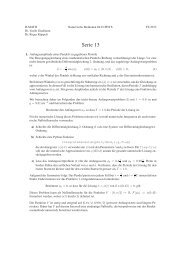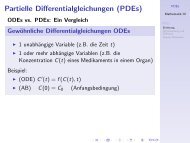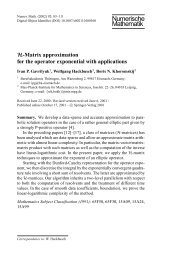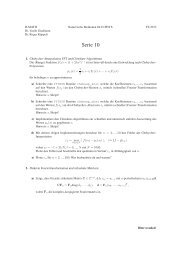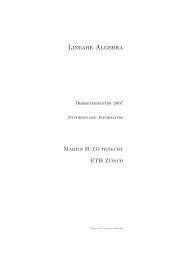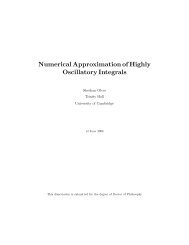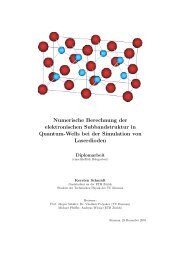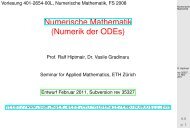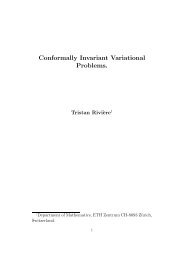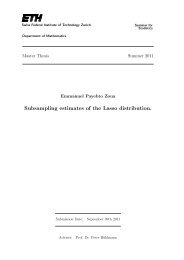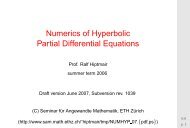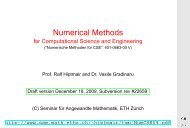Numerical Methods Contents - SAM
Numerical Methods Contents - SAM
Numerical Methods Contents - SAM
Create successful ePaper yourself
Turn your PDF publications into a flip-book with our unique Google optimized e-Paper software.
• Windows: for the exercises it is recommend to use a linux emulator like cygwin or VirtualBox:<br />
http://www.virtualbox.org/ http://www.cygwin.com/<br />
Time Measurement:<br />
In order to compare the efficiency of different implementations we need to be able to measure the<br />
time spent on a computation. The following definitions are commonly used in this context:<br />
• the wall time or real time denotes the time an observer would measure between the program<br />
start and end. (c.f. wall clock)<br />
• the user time denotes the cpu-time spent in executing the user’s code.<br />
• the system time denotes the cpu-time that the system spent on behalf of the user’s code (e.g.<br />
memory allocation, i/o handling etc.)<br />
Unix-based systems provide the time command for measuring the time of a whole runnable, e.g.: time<br />
./runnable. For the measurement of the runtimes in c++, the clock()-command provided in the time.h<br />
can be used. These methods will not provide correct results for the time-measurement of parallelized<br />
code, where the routines from the parallelization framework should be used. (e.g. MPI_WTIME for<br />
MPI-programs)<br />
22 void r e s e t ( )<br />
23 {<br />
24 time =0;<br />
25 bStarted = false ;<br />
26 }<br />
27 private :<br />
28 double time ;<br />
29 bool bStarted ;<br />
30 } ;<br />
1 /∗<br />
Code 1.4.12: Measuring real, user and system time from C++ on unix based systems<br />
2 ∗ unixTimer Class using times ( )−command from the unixbased times . h<br />
3 ∗ t h i s class w i l l r e p o r t the user , system and r e a l time .<br />
4 ∗/<br />
5 #include <br />
6 #include <br />
7 #include <br />
8 class u n i x t i m e r {<br />
9 public :<br />
10 u n i x t i m e r ( ) : utime ( 0 ) , stime ( 0 ) , r t i m e ( 0 ) , bStarted ( false )<br />
11 { }<br />
Ôº½ ½º<br />
Ôº¿ ½º<br />
12<br />
Code 1.4.11: Measuring CPU time from C++ using clock command<br />
1 #include <br />
2 #include / / header for clock()<br />
3<br />
4 /∗<br />
5 ∗ simple Timer Class , using clock ( )−command from the time . h ( should work<br />
on a l l p l a t f o r m s )<br />
6 ∗ t h i s class w i l l only r e p o r t the cputime ( not w a l l t i m e )<br />
7 ∗/<br />
8 class simpleTimer {<br />
9 public :<br />
10 simpleTimer ( ) : time ( 0 ) , bStarted ( false )<br />
11 { }<br />
12 void s t a r t ( )<br />
13 {<br />
14 time= clock ( ) ;<br />
15 bStarted =true ;<br />
16 }<br />
17 double getTime ( )<br />
18 {<br />
19 a ssert ( bStarted ) ;<br />
20 return ( clock ( )−time ) / ( double )CLOCKS_PER_SEC; ;<br />
13 void s t a r t ( ) { r t 0 =times (& t0 ) ; bStarted =true ; }<br />
14<br />
15 double stop ( ) {<br />
16 tms t1 ;<br />
17 long r t 1 ;<br />
18 a ssert ( bStarted ) ;<br />
19 r t 1 =times (& t1 ) ;<br />
20 utime = ( ( double ) ( t1 . tms_utime−t0 . tms_utime ) ) /<br />
CLOCKS_PER_SEC∗10000;<br />
21 stime = ( ( double ) ( t1 . tms_stime−t0 . tms_stime ) ) /<br />
CLOCKS_PER_SEC∗10000;<br />
22 r t i m e = ( ( double ) ( r t1−r t 0 ) ) / CLOCKS_PER_SEC∗10000;<br />
23 bStarted = false ;<br />
24 return r t i m e ;<br />
25 }<br />
26<br />
27 double user ( ) { a ssert ( ! bStarted ) ; return utime ; }<br />
28 double system ( ) { a ssert ( ! bStarted ) ; return stime ; }<br />
29 double r e a l ( ) { a ssert ( ! bStarted ) ; return r t i m e ; }<br />
Ôº¾ ½º<br />
Ôº ½º<br />
21 } 33 tms t0 ;<br />
30<br />
31 private :<br />
32 double utime , stime , r t i m e ;


